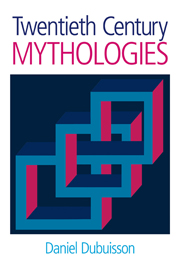Book contents
- Frontmatter
- Epigraph
- Contents
- Foreword by Professor Robert A. Segal
- Preface
- Abbreviations
- Introduction: History and comparative epistemology
- Part I Georges Dumézil, or Society
- Part II Claude Lévi-Strauss, or the Mind
- Part III Mircea Eliade, or the Sacred
- 12 Fascism and mysticism
- 13 Primitive ontology
- 14 The eternal return of anti-Semitism
- 15 The neo-paganism of homo religiosus
- 16 Metaphysics and politics: Eliade and Heidegger
- Addendum III Esotericism and fascism
- Addendum IV The reconstruction of prehistoric religions
- Addendum V The Eliadean conception of symbolism
- Addendum VI Forgetting the Shoah
- Conclusion: Modern theories of myth and the history of Western thought
- Bibliography
- Index
Addendum V - The Eliadean conception of symbolism
from Part III - Mircea Eliade, or the Sacred
- Frontmatter
- Epigraph
- Contents
- Foreword by Professor Robert A. Segal
- Preface
- Abbreviations
- Introduction: History and comparative epistemology
- Part I Georges Dumézil, or Society
- Part II Claude Lévi-Strauss, or the Mind
- Part III Mircea Eliade, or the Sacred
- 12 Fascism and mysticism
- 13 Primitive ontology
- 14 The eternal return of anti-Semitism
- 15 The neo-paganism of homo religiosus
- 16 Metaphysics and politics: Eliade and Heidegger
- Addendum III Esotericism and fascism
- Addendum IV The reconstruction of prehistoric religions
- Addendum V The Eliadean conception of symbolism
- Addendum VI Forgetting the Shoah
- Conclusion: Modern theories of myth and the history of Western thought
- Bibliography
- Index
Summary
In the preceding chapters I have shown that it is not possible to rid Eliade's work of the mystical postulates and irrational, woolly notions that run through it at every stage; nor can one ignore the strict affinities it presents with certain Fascist themes (anti-Semitism, spiritual elitism, and, in a general way, global hostility to the heritage of the Enlightenment). This group of traits also conforms to what we know today of the political engagements of Eliade in 1930s’ Romania, engagements that his compatriot Eugène Ionesco first deplored at the end of the Second World War.1 In addition, the lasting interest that Eliade showed in the numerous aspects of Western esotericism is proof of his intellectual fascination from this point with certain representatives of this occult strain, such as Guénon and Evola. In spite of these original basic failings, does this work – which, it must be remembered, has received the highest academic distinctions and continues to fascinate a large public – offer in addition a fertile and relatively original conception of the symbol or of symbolic function? Does it open new perspectives for anthropological reflection or to contemporary thought, the critics of which would agree in thinking that they could contribute, if they have not already done, and enrich this central question?
- Type
- Chapter
- Information
- Twentieth Century Mythologies , pp. 267 - 276Publisher: Acumen PublishingPrint publication year: 2006



